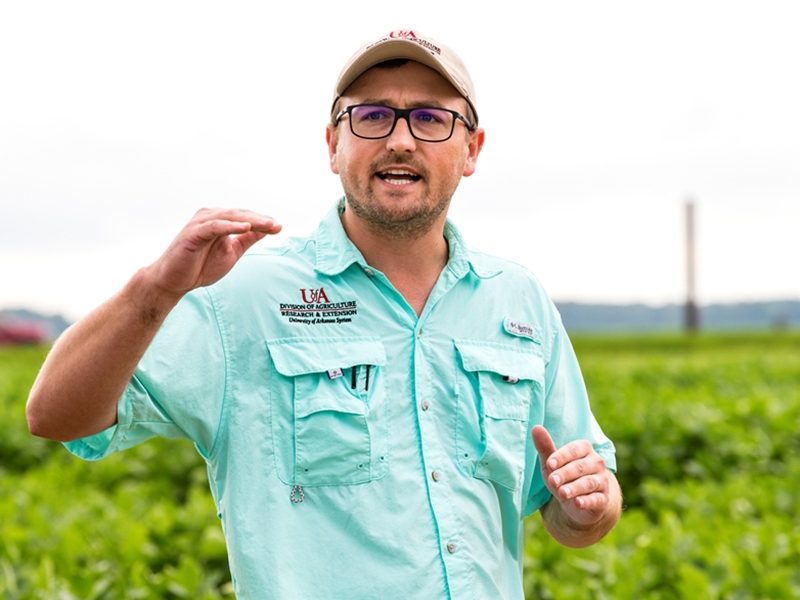
As much as the Mississippi Delta has been farmed, the impact that agronomic practices such as cover crops, carbon sequestration, reduced tillage and nutrient management have on Delta soil quality has not been heavily investigated.
A comprehensive three-year study by the Arkansas Agricultural Experiment Station, the research arm of the U of A System Division of Agriculture, will change that by evaluating the impact of conservation practices from short- and long-term field trials in the unique environment of the Mid-South.
With support from a nearly $750,000 grant from the U.S. Department of Agriculture's National Institute of Food and Agriculture, the study seeks to better understand how soil conservation and nutrient management practices affect soil health indicators in Mid-South irrigated crop production systems. The study will measure soils on 34 selected soil health measurements including pH, soil organic matter, water infiltration and total carbon.
Mid-South crop production is unique because most crop production is irrigated, and the soils are poorly drained, have low organic matter by nature, are usually heavily tilled, and mild winter temperatures allow soil microbes to work overtime to decompose crop residues, which makes it difficult to build up soil organic matter.
Gerson Drescher, assistant professor of soil fertility for the experiment station, is the principal investigator of the study. Studies oftentimes report a lack of relationship between soil health scores, soil management practices and crop yield, he explained.
"Ultimately, that is what a producer wants to know," Drescher said. "If they adopt certain soil conservation practices, such as cover crops or no-tillage, what is changing?"
Soil health assessments from commercial and public entities have become more popular in recent years, Drescher said, but there is still limited research focused on a comprehensive soil health assessment, integrating chemical, physical and biological soil properties. And there is even less research on the matter in the Delta, where most of Arkansas' row-crop farming takes place.
"We have research done with different crop production systems, either with no-tillage, different cover crop species, cash crops or nutrient management, that has been going for four, 10, 15 and even 22 years across Arkansas," Drescher said. "We have now a unique opportunity to look at soil health indicators in those long-term experiments to see what is changing and how certain management practices impact soil health, carbon sequestration and crop production resilience."
Soil data for the research will also be collected in collaboration with producers participating in the Arkansas Discovery Farms Program. The program is supported by a host of sponsors and industry stakeholders focusing on soil and water quality research. Currently, there are 15 active Discovery Farms across the state representing both row-crop and livestock production.
Looking at data from many short- and long-term field trails, Drescher and his team will see what soil properties are changing and if there is a connection between them that translates to more yield, increased water use efficiency and less need for fertilization. It will help identify practices that have the biggest impact on soil health and yield potential for silt loam soils in the Mississippi River Delta regions of Arkansas and be representative for soils in the Delta regions of Louisiana, Mississippi and Missouri, Drescher said.
Co-principal investigators on the project include Kristofor Brye, university professor of applied soil physics and pedology for the experiment station; Mike Daniels, soil and water conservation specialist for the Cooperative Extension Service; and Trent Roberts, associate professor of soil fertility and soil testing for the experiment station and endowed chair in soil fertility research.
To learn more about Division of Agriculture research, visit the Arkansas Agricultural Experiment Station website: https://aaes.uada.edu. Follow on Twitter at @ArkAgResearch. To learn more about the Division of Agriculture, visit https://uada.edu/. Follow us on Twitter at @AgInArk. To learn about extension programs in Arkansas, contact your local Cooperative Extension Service agent or visit www.uaex.uada.edu.
About the Division of Agriculture
The University of Arkansas System Division of Agriculture's mission is to strengthen agriculture, communities, and families by connecting trusted research to the adoption of best practices. Through the Agricultural Experiment Station and the Cooperative Extension Service, the Division of Agriculture conducts research and extension work within the nation's historic land grant education system.
The Division of Agriculture is one of 20 entities within the University of Arkansas System. It has offices in all 75 counties in Arkansas and faculty on five system campuses.
The University of Arkansas System Division of Agriculture offers all its Extension and Research programs and services without regard to race, color, sex, gender identity, sexual orientation, national origin, religion, age, disability, marital or veteran status, genetic information, or any other legally protected status, and is an Affirmative Action/Equal Opportunity Employer.
Topics
Contacts
John Lovett, project/program specialist
Agricultural Communication Services
479-763-5929,